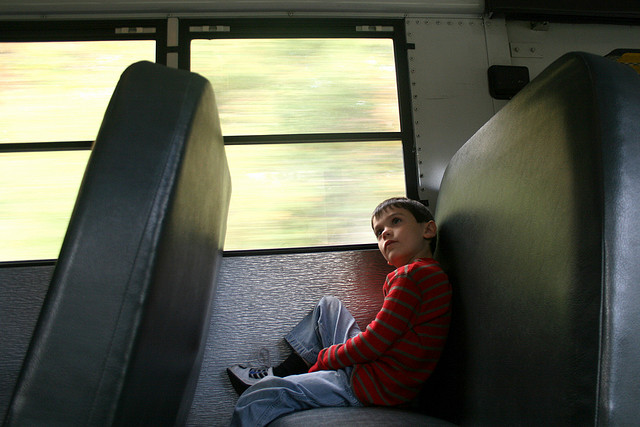Bullying comes in all shapes and sizes. It happens in any setting to kids of any age, and may occur physically, verbally or online.
A life changing event in the family can leave your child vulnerable – and unfortunately, kids can be cruel. Bullies pick at these vulnerabilities mercilessly, and have the potential to leave your child physically and emotionally defeated.
Despite these effects, many kids being bullied are afraid to speak up, and feel backed into a corner of shame and embarrassment by their attackers. Kids may also think that the bullying is so out of control that their parents wouldn’t be able to help them anyway; that any intervention would only make matters worse. Or, they may simply feel though you wouldn’t understand.
In any case, it is important to see the signs of a bullied child early, and to start a conversation to break the cycle.
Signs of bullying
Below are some of the signs that your child is being bullied.
Detachment from friends and activities they once enjoyed: If the bully is located within your child’s friends group or sports team, your child will do everything in their power to avoid them. The shame that bullying creates may also mean that they simply don’t want to the face people they once enjoyed being around.
Increase in medical complaints like headaches or nausea: The stress caused by bullying may have a physical effect on your child. These complaints may also be made up by a bullied child in order to avoid going to school.
Increase in wagging or absences from school: In order to escape school bullying your child may avoid school altogether.
Appearance of marks, bruises or scratches that are unexplained: All obvious signs of physical bullying. In extreme cases, certain marks may also be the result of self-harm, brought on by self-loathing as a result of bullying.
Frequent loss or damage of possessions: A bully may steal or break their victim’s belongings.
Sudden drop in grades and general enthusiasm for school: A bully can rob their victim of the confidence and motivation to achieve, or may make it their mission to break their victim’s concentration consistently throughout class.
Depressed, anxious or emotionally inconsistent behaviour: The psychological toll that bullying takes can show in a bullied child’s moods and overall happiness levels.
Appetite changes: Bullying can make a child depressed, which in turn may decrease their appetite, causing them to eat less food, less often. Alternatively, if you notice your child is starving hungry when they get home from school, it could be a sign that a bully is tampering with their food.
Drop in self-esteem: Your child may express opinions that reflect a decreased self-worth and become frustrated with themselves quickly.
Speaking to a bullied child
Approaching the issue of bullying can be difficult – if you are too abrupt, you risk embarrassing your child and pushing them away. You may wish to try the following techniques to give a bullied child the opportunity to initiate a conversation themselves.
Ask indirect questions
Rather than coming straight out with a question about whether they are being bullied, ask your child smaller questions like whether they enjoyed their lunch, where they got that bruise or if they will be spending time with their old group of friends this weekend. While their verbal answer may not give you anything revealing initially, their body language may give you an indication of what is left unsaid. If they flinch, hesitate or exhibit nervous behaviours like fidgeting or reduced eye contact in their response, chances are that what you have brought up has hit a nerve. Over time, you can gently pursue the topic of an old friend they seem sensitive on now and give them the chance to say what is on their mind.
Point out other instances of bullying
If you notice bullying being depicted on a TV show or see it occurring elsewhere, point it out to your child and start a conversation that isn’t directly connected to their experience. By telling them that the bullying shown on-screen isn’t okay and telling them how you think victims of bullying should react, you at least get the chance to convey some advice without them feeling embarrassed or interrogated. In so doing, you may give your child the push they need to overcome their fear and to divulge their experience.
Opening a dialogue
Whether or not you feel that your child is ready to talk about their bullying, sometimes there is no choice but to rip off the bandaid and be blunt about what you have noticed. Tell them that you have seen some changes in them lately, and that you are genuinely worried about their well-being. Reassure your child that the bullying is not their fault and have them understand that they are not a lesser person because of it – even the coolest celebrities were bullied in high school.
Throughout your conversation, try to establish who is doing the bullying, what type of bullying it is and why your child is targeted. Once you know this, give them points on how to handle bullying. Some common advice includes avoiding the bully and trying not to react to what the bully does or says. In the end, what bullies crave is a response – if you don’t give it to them, they will get bored and move on.
Most importantly, ask your child what they want you to do about it. There is no use charging up to the school or confronting the bully’s parents if this is exactly the opposite of what your child had hoped would happened. In fact, it will only make them more embarrassed and reduce the likelihood that they will speak to you again about similar issues in the future. While taking your concerns to the school is something that you will likely need to do in the long run, give your child ownership over their situation and hear them out.
Bullying makes kids feel belittled and silenced – it is your job to remind them that they still have a voice.
Talking to the school
If the bullying continues, make an appointment with the school to voice your concerns. The school may be able to shine some light on the situation and to establish an action plan – every school is required to have bullying policy that can be put in to play to protect children like yours. What’s more, classroom teachers and guidance counsellors know more than their students think they do. Even if a child is being bullied outside of classroom hours, generally they can pick up behaviour changes in kids and detect the source of the problem.
While change won’t happen overnight, combining the efforts of the school with your own will improve your child’s situation and ideally see the bullying stop altogether.
Rebuilding your child’s self-esteem
Restoring the confidence of a child whose self-esteem is in tatters is all about shifting their focus. While you want your child to come to you when they have had a rough time, be sure to help them find a positive aspect to each day as well. It is easy for kids in strife to feel like life is all bad – it is up to you to remind them of the good. Arrange for your child to spend time with friends who they get along with, and even do some sneaky calling around to organise a surprise slumber party. You can also encourage your child to sign up to a new sports team or club, giving them a new concentration where they can forge fresh friendships and re-discover their own abilities.



